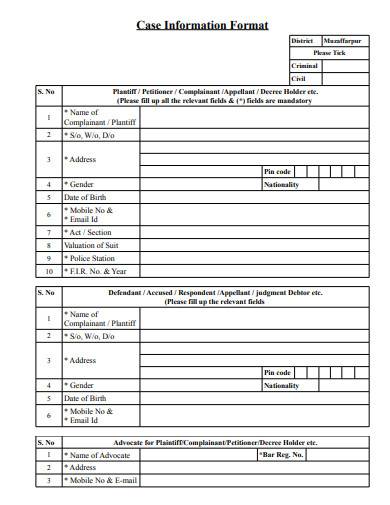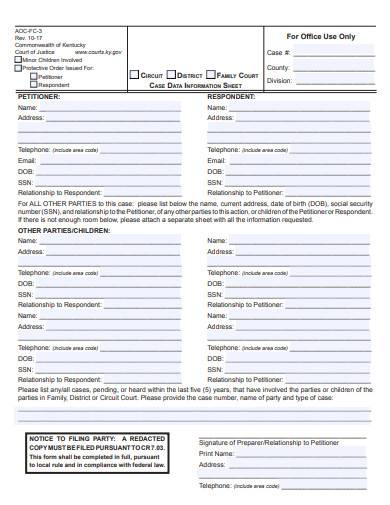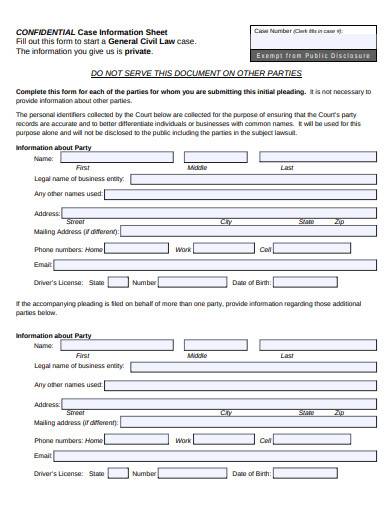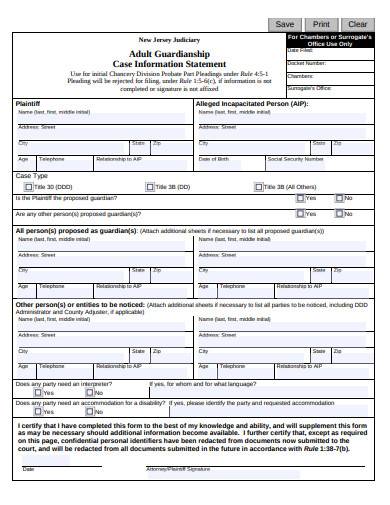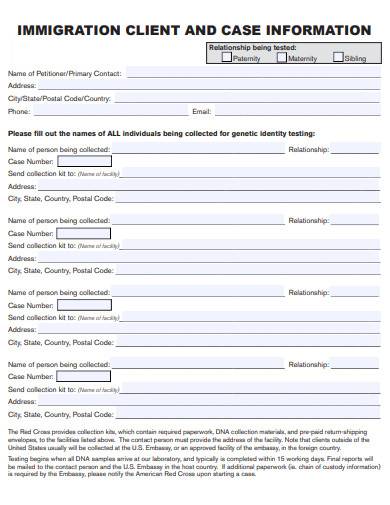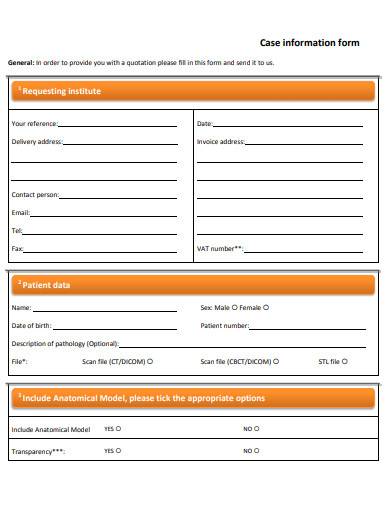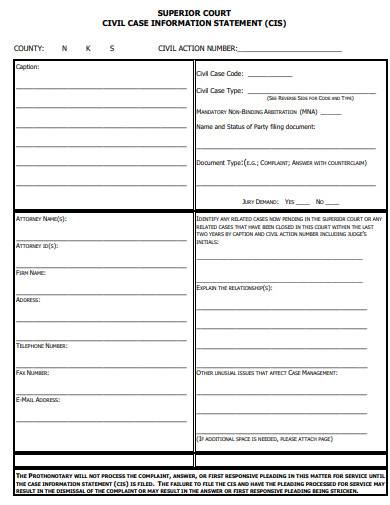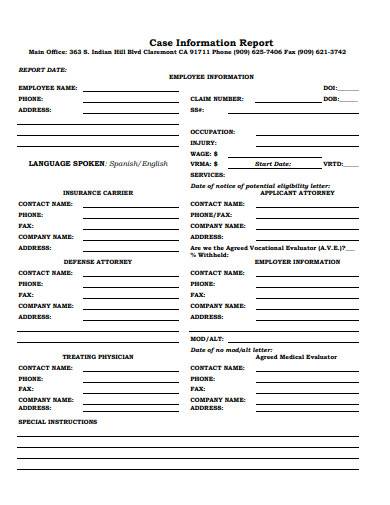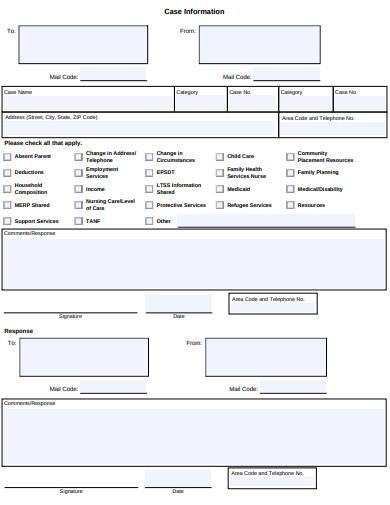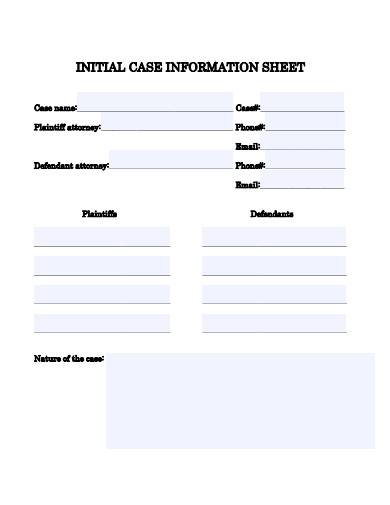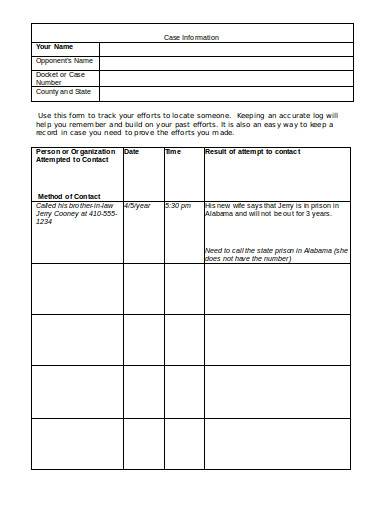Every bit of information is valuable. It is used to answer questions and resolve issues that cause uncertainty. If you look online, the number of information you can find is beyond what you can comprehend. During court proceedings, the presentation of facts and relevant information influence the judge’s decision. Legal professionals use a similar case summary or case report to create strategies to win the cases that they handle. But the most effective strategy to win a case starts with the gathering of court case information.
What Are Case Information Samples?
Case information samples, also known as information sheets are tools used in gathering different types of information for court evidence presentation. Case information include written sworn statements from witnesses, photos used as evidence, actual weapons used for criminal cases, and tons of valuable document. The details of a case are recorded in a case information sheet, which is then stored in a file that is specifically dedicated to a specific case. After passing judgment on the case or the accuse, the details of the completed case are then stored in a centralized database and a physical copy is stored in a library in an investigation facility or headquarters.
Thorough investigation and proper recording of facts are crucial during case analysis. Case information must be factual and true, especially those statements provided by court witnesses. Providing false information is illegal and whoever commits this crime will be punished accordingly under the law.
What Case Is a Case?
Case information is a big deal in legal cases, no matter how big or small the new information is. The size of the information doesn’t really matter, but its weight does. And the weight of information differs depending on the type of legal case. There are mainly three types of legal cases namely, criminal cases, civil cases, and family cases.
Criminal Cases
Those who have violated the law, specifically those who have committed crimes (murder, fraud, arson, abuse, drugs, felony, conspiracy, theft, traffic offenses, etc.), are charged with criminal cases. Criminal cases include serious crimes so they are charged by government officials called public prosecutors or district attorneys. But it can be settled through a plea bargain before the trial. The punishment of criminal cases may be severe, but it’s always equivalent to the crime that has been done. Examples of criminal cases punishment are hefty fines, probation, community service, lifetime imprisonment, or a death sentence.
Civil Cases
Business cases and conflicts between people and certain institutions that involve money fall under civil cases. People who file civil cases or lawsuits claim to have suffered at a certain degree and request a remedy in return. Money matters in this type of legal case and so the most sought remedy is payment for damages. Other sought remedies include restrictions from doing certain acts, public apologies, declaratory judgment, etc. Other cases that are considered civil in nature are claims for breach of contract, loan agreements, damage to property, unpaid bills, landlord/tenant agreement, etc.
Family Cases
Family cases are handled by family courts. It is usually categorized under civil cases because how family cases are dealt with is very similar to that of civil cases. Family cases are issues between parents, children, and spouses. The wide variety of cases covered by family cases usually involve domestic violence. Examples of family cases include child custody, name changes, juvenile matters, protection against domestic violence, guardianship, divorce or marriage dissolution, etc.
10+ Case Information Samples
1. Case Information Format in PDF
2. Case Data Information Sheet Template
3. Confidential Case Information Sheet Sample
4. Adult Guardianship Case Information Statement Template
5. Immigration Client and Case Information Sample
6. Case Information Form Sample
How to Find Details of a Court Case
Information about court cases is stored in record centers in the United States. These documents are preserved to be used for future references and to aid in future cases that may seem connected with the past. Finding records of court cases is easy. Here are simple steps that will help you get started.
Step #1: Visit NARA’s website
The National Archives and Records Administration (NARA) is discontinued to their on-site review services because they no have a case information management system that allows people to view case information online. By visiting their website you’ll find out which process your state follows in acquiring records of federal or state court cases.
Step #2: Order court records online
Use this option only if ordering court records online is allowed in your area or state. In some states, ordering case information online is only available in the state’s federal record centers. To place an order online, you’ll need to go to the Order Reproductions page of the NARAs website, select “Order Reproductions” then select “Court Records”. You’ll be asked what court the case falls under. There will be on-screen prompts that will guide you with creating an account to place your order.
Step #3: Order court records by mail/fax/email
Download the appropriate form that uses a case information format of the type of court record you want to request. Complete the form and then mail/fax/email to the appropriate facility or the federal records center in your state.
Step #4: Pay the fees for the requested records
The order or request cannot be processed until you make the payment. Once payment has been confirmed, your order will be processed. In case you want to view the court records in person, you can visit the Federal Court office.
7. Civil Case Information Statement Template
8. Case Information Report Sample
9. Case Information Sample
10. Initial Case Information Sheet Sample
11. Case Information in DOC
You can practice gathering case information with the use of the case information samples above. Through the samples, you will become familiar with different case information format used by different courts for different legal cases. Start collecting samples, now!
Related Posts
Weekly Schedule Samples & Templates
Contractual Agreement Samples & Templates
FREE 9+ Amazing Sample Church Bulletin Templates in PSD | PDF
Sample Business Card Templates
Sample Cashier Job Descriptions
Questionnaire Samples
FREE 10+ Sample HR Resource Templates in PDF
FREE 10+ HR Consulting Business Plan Samples in MS Word | Google Docs | Pages | PDF
FREE 49+ Sample Job Descriptions in PDF | MS Word
FREE 16+ Nonprofit Budget Samples in PDF | MS Word | Excel | Google Docs | Google Sheets | Numbers | Pages
FREE 13+ Academic Calendar Templates in Google Docs | MS Word | Pages | PDF
FREE 10+ How to Create an Executive Summary Samples in Google Docs | MS Word | Pages | PDF
FREE 23+ Sample Event Calendar Templates in PDF | MS Word | Google Docs | Apple Pages
Company Profile Samples
FREE 10+ Leadership Report Samples [ Development, Training, Camp ]

